10 Ways to Improve Your Social Signals for SEO. SEO is multidisciplinary, meaning working on other areas of our digital marketing strategy can have ancillary benefits to our web pages’ performance in the SERPs. This includes your social media strategy and the effort to improve the social signals of our web pages.
The connection between social signals and SEO is an indirect relationship, meaning improved social signals will not result in higher ranking positions. However, the efforts to improve social media visibility are certainly correlated to our SEO efforts, which is why the relationship is important for digital marketers to leverage.
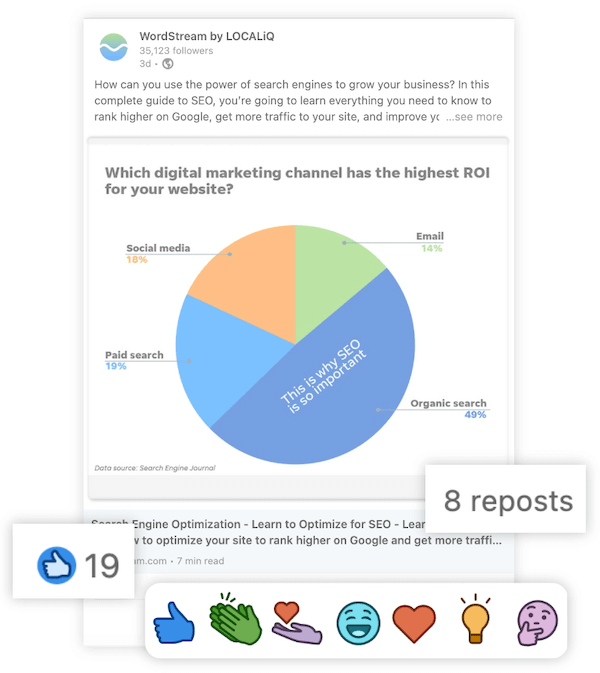
This guide will cover the fundamentals of that relationship. Read on to learn about how social signals impact SEO and ranking, and how you can improve them.
Table of contents
What are your social signals?
Social signals are essentially any interactions with a social media profile or its content. From a social media marketing standpoint, these interactions are simply social media engagement, but from an SEO standpoint, they are signals that help search engines like Google to understand the identity, popularity, and reliability of a user, profile, or its content.
When you think of all the various social media platforms out there, there are many types of metrics that can be categorized as social signals. Here are some of the most common by platform:
- Facebook: Follows, likes, dislikes, comments, shares, views
- Instagram: Follows, likes, shares, favorites, saves.
- Twitter: Follows, Tweets, Retweets, Quote Tweets, replies
- Pinterest: Follows, pins, views
- LinkedIn: Connections, likes, comments, shares
- Reddit: Upvotes, comments
Are social signals a ranking factor?
Google relies on over 200 ranking factors when determining how to rank web pages, but many SEOs are not in full agreement on the role social signals have in ranking—due in large part to Google’s mixed messages in the matter.
2010: Google says yes…sorta
In this short Google Search Central video from 2010, a viewer asks if Google uses Twitter and Facebook links (e.g., twitter.com/wordstream) as a ranking signal, referring to a [recent at the time] article by Danny Sullivan.
Google software engineer Matt Cutts responds saying: “We do use Facebook and Twitter links in ranking as we always have…but in addition, we’re also trying to figure out a little bit about the reputation of an author or creator on Twitter or Facebook.” He then goes on to explain that (at the time) they are more important for real-time searches, and that the quality of those engagements matters more than the quantity.
2014: Google says not really
In another Google Search Central video from 2014, a viewer asks “Are Facebook and Twitter signals part of the ranking algorithm? How much do they matter?” Matt emphasizes that because these pages can change so often as users update or post to their profiles, Google engineers are less focused on being able to extract any signals (e.g., likes, comments, shares) from them.
2022: Google says it’s a quality indicator
Fast forward to 2022 and Google has recently made it clear that it is working hard to understand the authority of an author or creator via social media. The reputation of a web page creator is becoming an increasingly important quality indicator for organic SEO, and Google looks to social media profiles to better understand authorship.
So although convoluted, we do know that Google is certainly paying attention to the social media pages of our websites and the profiles of our content creators—and so, too, should anyone who wants to rank higher in organic search.
How do social signals impact SEO?
The reality is, SEOs are still using studies and experimentation to discover the exact impact of social signals on SEO performance.
Although there is some disagreement in the industry, we can make some strong inferences about the indirect impact that social signals have on ranking based on how confirmed ranking factors overlap with the social media presence of a website.
Social media profiles can rank
Google indexes social media profiles, meaning they will rank in search engine results.
And because Google wants to connect websites with their respective social media pages, we can be confident that Google is looking for signals that connect our websites to specific profile URLs.
Although less important to ranking for your target keywords, your branded search results are important to your SEO reputation management strategy. If you Google your business name, it is likely your Facebook, Linkedin, or Twitter page will rank on page one.
For Twitter specifically, Google displays the three most recent tweets in the SERP (do note though that Google is not actually displaying likes or retweets there).
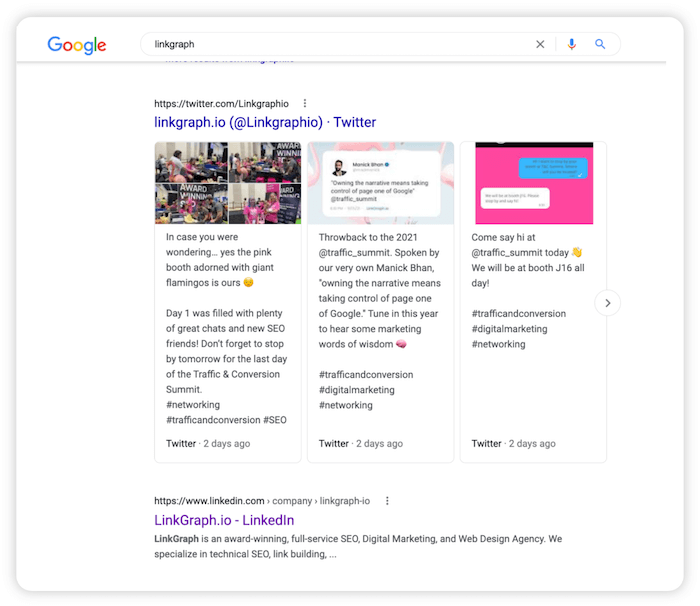
A strong social media presence reflected in the SERPs can help build your audience’s trust in your brand, meaning more clicks in the future if they come across your web pages in organic search.
More social shares can result in more backlinks
Throughout the history of search engines, backlinks have always been the most important ranking factor.
But if a person Tweets with a link back to a web page, it doesn’t actually send any link equity to your website like a backlink on a web page does.
However, your content being shared and circulated on social media will mean more traffic being sent to your web pages, more eyes on your content, and more possibilities that a user finds the content valuable and then chooses to link to it.
The first step to being linked to is being seen. Social media is a great way to be seen by a larger audience, and this is why it can also be a part of your link-building strategy.
Quality content does well on both social and search
Let’s say a web page has been shared thousands of times on social media. Across those thousands of shares may be hundreds of thousands of likes, comments, and engagements.
If a web page is getting that much social proof, it most likely contains pretty valuable content for the user.
Often, web pages that rank well in search results also have strong social media signals. But correlation does not equal causation, meaning there’s no reason to conclude that those social signals are being used by Google to evaluate quality and determine rankings.
However, just like quality content is rewarded in social media, it is also rewarded by Google. Creating quality content will help you improve your visibility and performance in both digital channels, as long as you share your content on social media and optimize for organic SEO.
10 tips to improve your social signals for SEO
Because of the above connections, taking the time to improve your social signals can have positive impacts on your SEO and other areas of your digital marketing strategy.
So here are some tips for improving your social signals in order to generate those ancillary benefits and improve the overall online visibility of your web pages.
1. Link your website & social media profile pages
As stated, Google is looking to connect websites to social media accounts.
You can make it easier by ensuring your website links to your social media profile pages, and vice versa.
This is a basic step, but an important one. Previously, SEOs used social media schema to directly communicate to Google their social media pages, but Google no longer uses this schema type.
So make it easy for Google to automatically identify the connection by reciprocal linking.
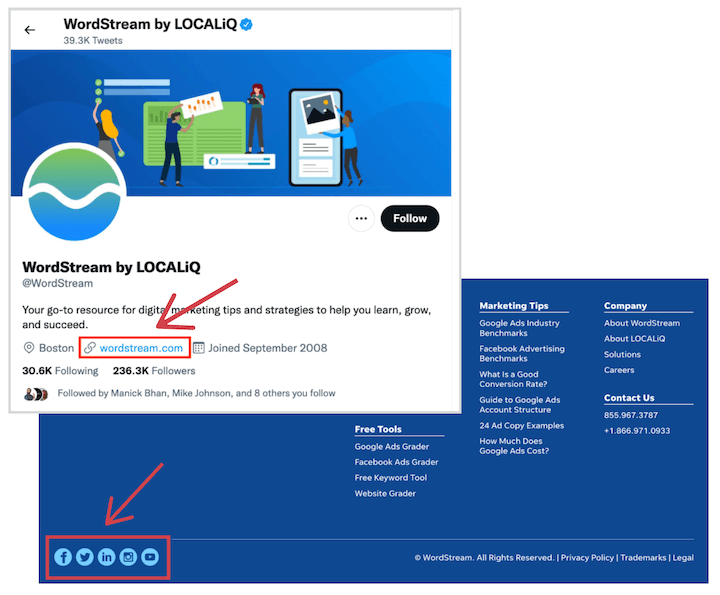
However, you don’t want links to social profiles on your homepage to pull clicks away from your CTA buttons or lead generation forms. For that reason, I suggest the footer of your website to place social media links.
These links can also improve your user experience. Whether a user discovers your website or your social media page first, you want to make it as easy as possible for them to find other important urls related to your brand.
2. Optimize your social profile pages
Just like with a web page or blog post, your social media profile pages can benefit from on-page optimization.
Including target keywords in your About Us, Services, Products, or the other editable areas that different social media profiles allow can help with Google’s understanding of your website’s relationship to those keywords.
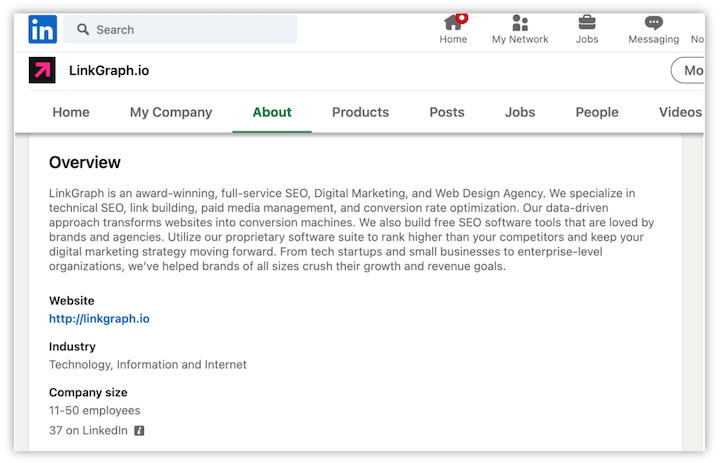
It’s important to fill out every section of your profile, as Google will be crawling and rendering the content of these pages to understand what your business is all about. Each area provides you more opportunities to add important keywords related to your business.
3. Claim your Knowledge Panel
Google Knowledge Panels are a SERP feature that consolidate all of the key information about a brand for users, including social media profiles.
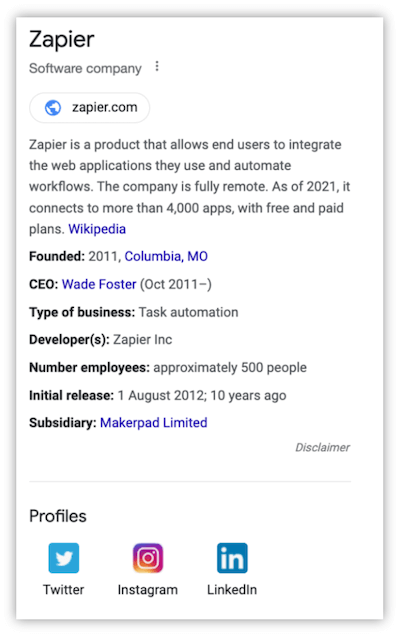
They most often rank for branded searches, or when someone searches your business name.
Google automatically generates their Knowledge Panels, meaning there is no way to submit for one if your brand does not yet have one appearing.
But if you do, make sure that your organization claims your Knowledge Panel. This allows you to have more direct communication with Google about the information that is populated there.
4. Promote your content regularly across social platforms
If you are regularly publishing content on your website like blogs, articles, or ebooks, you should also be regularly promoting those content assets on your social media accounts.
The more posts and content you share on social media platforms, the more opportunities you have to earn those likes, comments, shares, and engagements.
You can use tools like Sprout Social to plan out and automate your postings to your Twitter, Facebook, LinkedIn, and Instagram accounts. If you haven’t yet brought on a social media manager, you may want to consider doing so, or outsourcing to an agency.
Here are some tips for finding ways to share your website content on a daily basis:
- Include links to the newest content on your website soon after it has been published
- Post and link to any updated content when it provides new or better information to users
- Share and link to relevant content on your website when the topic area comes up in the news, conversations, or trending topics happening in your industry
- When a user comments with a question about a particular topic, service, or product, respond with a link to other relevant content on your website that answers their question
These are just a few examples of ways to create social media posts that include links back to your website.
Although you can certainly create posts without any links to your content, those tweets will not actually help your SEO. To create any indirect benefits for SEO, your posts need to include links back to your web pages.
5. Add social plugins to make your content easily shareable
Sometimes, website visitors are more likely to share content if it is easy to do so.
Adding social plugins to your content management system makes it simple for website visitors to share your high-quality content on their social media accounts.
For example, Wordstream encourages users to click with social icons that stick as the user scrolls through blog posts.
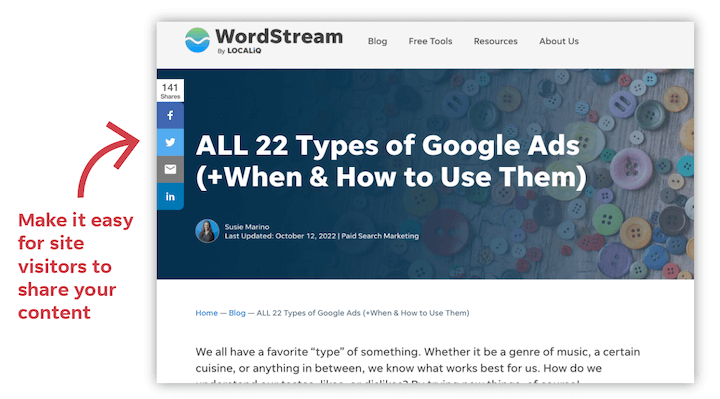
When a user clicks to share the content on their social media, the post is ready without them having to do any additional work to make an engaging, clickable, and likable social media post.
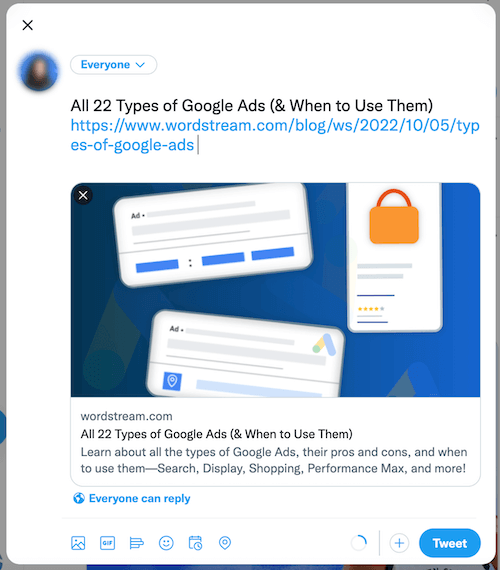
6. Make your content more clickable with Twitter cards and Open Graph tags
If you want your web pages to be engaging to social media users when shared, leverage Open Graph tags and Twitter cards.
These are simply pieces of metadata that influence how your web content looks when shared on social media platforms. Here is an example of a “Summary with Large Image” Twitter card.

In HTML, it looks like this:

Having missing Open Graph tags and Twitter cards can make your content less clickable when shared on social media. For example, this web page is missing a “twitter: image” property and thus populates on Twitter like this: just text with no appealing image.
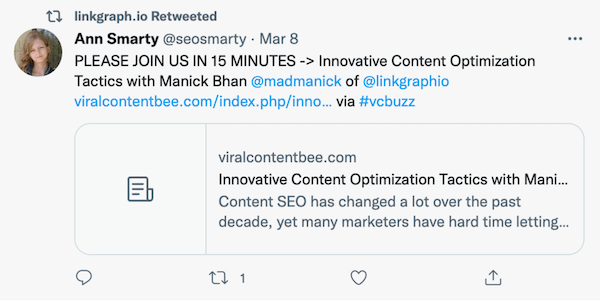
In comparison to a web page that has a defined “twitter: image property”:
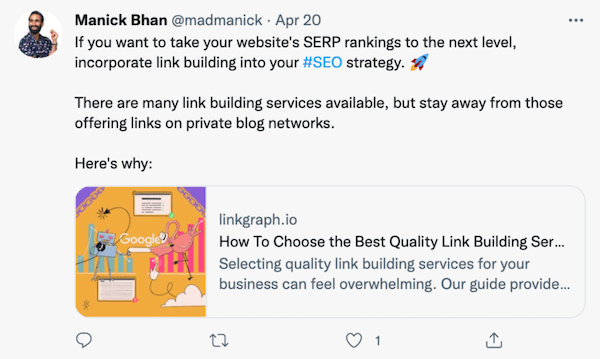
Which piece of content are you more likely to click on?
If you need help implementing these important tags to your web pages, read these Open Graph tag and Twitter cards guides.
7. Actively respond to comments and shares
A part of increasing your social signals is being “active,” on social media.
That means responding to comments and shares and showing users that your profile is managed by a real-life person.
Actively responding to comments and shares can also mean more opportunities to share additional relevant links to other pages on your website with users.
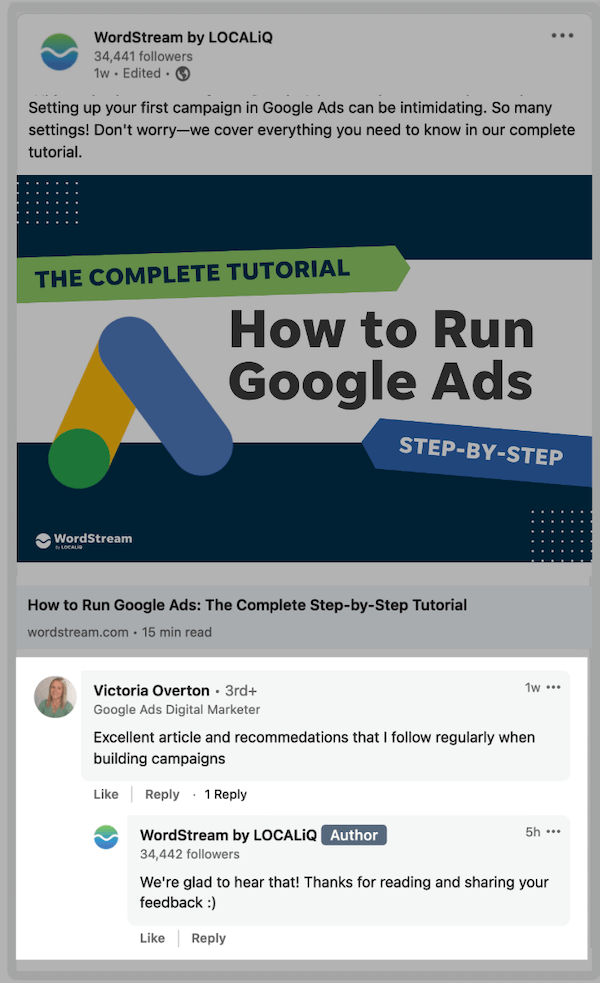
If you are busy managing other parts of your business, consider hiring a social media marketing manager or outsourcing your social media tasks to an agency.
8. Share other people’s content and foster partnerships
Just like you’re seeking to improve your social signals, so are other people in your industry.
Sharing valuable content from other website’s can be a great way to start to build partnerships and show you are an active member of your industry community.
Retweet other content that you find valuable, or thank people for sharing yours. This might mean more shares or likes from those same accounts in the future.
9. Don’t pay for fake followers or engagement
Although social media signals are beneficial, fake follows or engagements from bots or computer software are not.
The reality is, social media platforms are getting better at identifying and removing bots from their platforms.
So although those likes or engagements may help you in the short term, they are most likely temporary. It’s not worth the risk or the price.
10. Elevate the social media reputation of your creators
As stated earlier, Google is paying closer attention to the creators of web page content. Also, search engine crawlers are using social media platforms to better understand author authority.
So you can do the work of elevating your creators by adding author bios to your blog posts and articles. Linking to their social media profiles, and tagging them when sharing their content, are both ways to elevate their reputation as expert creators.
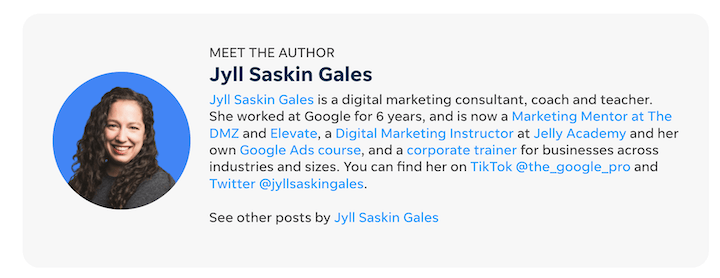
When Google sees that your web page content is created with expert authorship, Quality Raters are more likely to see your overall website as authoritative and trustworthy.
Final thoughts on social signals
The relationship between social signals and SEO is an important one, and any business can combine its social media and SEO strategies to elevate online visibility and presence.
Investing in both strategies is a strategic and cost-effective way to grow. So make sure that you have the right team members doing the daily tasks required to increase social signals. With time and consistency, you’ll most likely see measurable results!
To recap, here are 10 ways to improve your social signals which can help influence your rankings:
- Link your websites and social media profiles
- Optimize your social profile pages
- Claim your Knowledge Panel
- Promote your content regularly on social
- Add social sharing widgets to make your content easily shareable
- Make your content more clickable with Twitter cards and Open Graph tags
- Actively respond to comments and shares
- Share other people’s content and foster partnerships
- Don’t pay for fake followers or engagement
- Elevate the social media reputation of your creators
Kết thúc
Ngoài các bài viết tin tức, bài báo hàng ngày của SEMTEK, nguồn nội dung cũng bao gồm các bài viết từ các cộng tác viên chuyên gia đầu ngành về chuỗi kiến thức Kinh doanh, chiến lược tiếp thị, kiến thức quản trị doanh nghiệp và kiến thức quản lý, phát triển tổ chức doanh nghiệp,.. được chia sẽ chủ yếu từ nhiều khía cạnh liên quan chuỗi kiến thức này.
Bạn có thể dành thời gian để xem thêm các chuyên mục nội dung chính với các bài viết tư vấn, chia sẻ mới nhất, các tin tức gần đây từ chuyên gia và đối tác của Chúng tôi. Cuối cùng, với các kiến thức chia sẻ của bài viết, hy vọng góp phần nào kiến thức hỗ trợ cho độc giả tốt hơn trong hoạt động nghề nghiệp cá nhân!
* Ý kiến được trình bày trong bài viết này là của tác giả khách mời và không nhất thiết phải là SEMTEK. Nhân viên tác giả, cộng tác viên biên tập sẽ được liệt kê bên cuối bài viết.
Trân trọng,
Từ khóa:
- Social signals
- social signals psychology
- social signals checker
- social signals google ranking
- social signals are identical to backlinks
- social signals are used to determine topic authority
- Social signal check
- domain authority
Các chuyên mục nội dung liên quan
- Bản tin số mới nhất | Góc chia sẻ kiến thức số hóa & Chiến lược kinh doanh
- Trang chủ
- Marketing tổng thể
- SEO
- Thiết kế Website
- Web Hosting
- VPS



